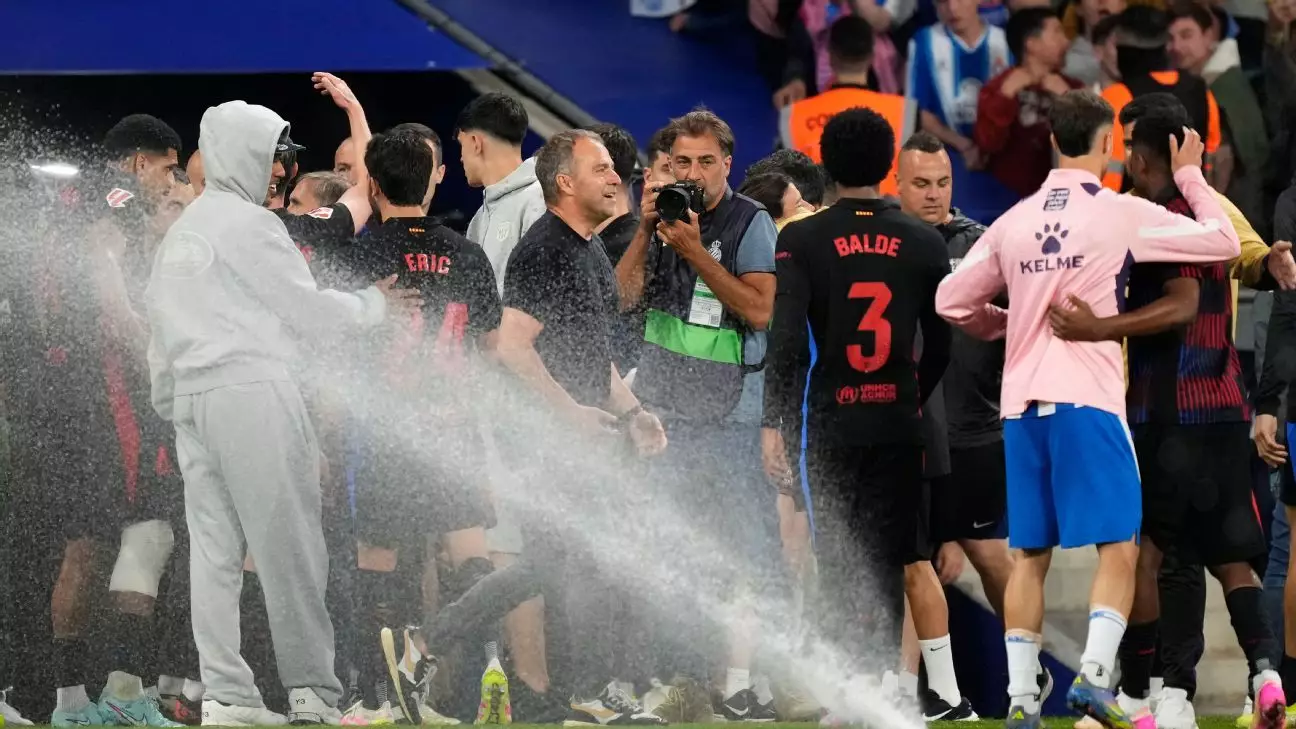In the high-stakes world of football, every match has the potential to serve as a stage for both triumph and turmoil. The recent clash between FC Barcelona and Espanyol showcased not just the game’s competitive spirit but also the often-overlooked significance of leadership during tense moments. After securing the LaLiga title with a 2-0 victory, Barcelona’s coach Hansi Flick demonstrated remarkable sportsmanship and strategic thinking, decisively moving his players off the pitch before an explosive atmosphere could escalate. This kind of leadership is not merely commendable; it’s essential in fostering a culture of respect and dignity within the sport.
This incident stands in stark contrast to Barcelona’s previous title win against Espanyol two years prior, which spiraled into chaos as home fans surged onto the field in an attempt to confront the visiting players. Flick’s foresight in whisking his team away from such potential upheaval not only preserved the integrity of the celebration but also reflected his understanding of the delicate emotional landscape of rival football. By redirecting the festivities to a protected environment, he ensured that his players could celebrate their achievements without further antagonism. Flick’s approach exemplifies how a coach can significantly influence a team’s experience, transforming a moment of victory into a genuinely festive occasion rather than one tainted by conflict.
A Tense Atmosphere and Tactical Responses
Tension inevitably builds during crucial matches, especially when the stakes are as high as winning a championship. Fans, players, and coaches alike navigate an emotional rollercoaster, and the pressure can lead to regrettable decisions. The RCDE Stadium echoed with cries of “Suspend the match” as the final whistle loomed, driven by frustration from the local supporters. Meanwhile, a pre-game incident involving a car crash left several fans injured, adding to the fraught atmosphere. It is within this complex environment that Flick’s calm demeanor shone through, epitomizing the best qualities of a coach. By handling the situation with professionalism, he not only safeguarded his players but also set a tone for mutual respect—an essential ethos in sportsmanship.
Flick’s tactical acumen was visible on the pitch with key moments during the match that demonstrated Barcelona’s superiority. Lamine Yamal’s stunning goal early in the second half fueled the team’s performance, marking not just an individual highlight but also a testament to strategic preparation that had been instilled by Flick throughout the season. The dismissal of Leandro Cabrera for Espanyol further shifted the momentum, and yet it was Flick’s handling of the post-match scenario that left a lasting impression. Rather than indulging in an aggressive celebration that could have incited further unrest, he chose restraint and caution, prioritizing respect for the opposing fans.
A Philosophy of Respect
What made this instance particularly remarkable was not merely the victory itself, but Flick’s underlying philosophy of respect—not just for the game, but also for those involved. The words of Espanyol’s coach, Manolo González, acknowledging Flick as “a gentleman” underscore the significance of dignity in competitive sports. González’s praise highlights how remarkably rare such fortitude can be in the midst of sports rivalry, where passions tend to overshadow common sense. Flick’s decision to celebrate privately, away from the fray, allows for an important discussion on the responsibility figures in sports hold in guiding their teams and fans toward constructive behavior.
This fits within a broader context of how accountability is perceived in athletics. In recent years, the football industry has witnessed outbursts of hostility among fans and players alike, often leading to regrettable incidents. Flick’s approach signals a refreshing departure from aggression and a movement toward unity within the sport. As such, it may serve as a blueprint for future coaches who find themselves at the intersection of triumph and tradition.
The Future Looks Bright
Currently, Barcelona’s triumph not only solidifies their status as LaLiga champions but also marks a significant milestone for Flick in his inaugural season. In securing a domestic treble that includes the Supercopa and Copa del Rey, his impact is undeniable, with aspirations for continued excellence evident across the squad. The anticipation of an open-top bus parade symbolizes not just celebration, but also the community that football fosters. Flick’s call to fans to enjoy the festivities signifies his commitment to ensuring that football maintains its core values amid the competitive chaos.
As the football world continues to evolve, exemplary leaders like Hansi Flick remind us that the game transcends scores and statistics—it’s about fostering integrity, fostering respect, and ultimately inspiring future generations to carry these values onward. By promoting sportsmanship in such an impactful way, he sets a challenging precedent that calls for others in the realm of sports to follow suit.


Leave a Reply